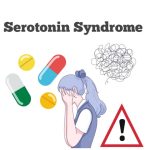Can Moclobemide Cause Serotonin Syndrome?

Moclobemide is a reversible inhibitor of monoamine oxidase type A (RIMA), an antidepressant medication primarily used to treat depression and social anxiety disorder. It was first developed in the 1960s and has a unique history.
Moclobemide was developed in the early 1960s by a Swiss pharmaceutical company called Hoffmann-La Roche. It was originally synthesized as a potential treatment for Parkinson’s disease. However, further research revealed its potential as an antidepressant. It was introduced to the market in the late 1980s and was initially marketed under the brand names “Aurorix” and “Manerix” in various countries.
Moclobemide works by inhibiting monoamine oxidase type A (MAO-A), an enzyme responsible for breaking down neurotransmitters like serotonin, norepinephrine, and dopamine in the brain. By blocking the action of MAO-A, it increases the levels of these neurotransmitters, which can help alleviate the symptoms of depression.
Moclobemide is considered a relatively safe antidepressant in comparison to older MAO inhibitors (MAOIs) because it is a reversible inhibitor, meaning that its effects are temporary and do not persist in the body. This reduces the risk of serious side effects associated with older, non-selective MAOIs. Moclobemide is primarily used to treat major depressive disorder and social anxiety disorder. Its effectiveness in treating social anxiety disorder is one of its distinguishing features.
Moclobemide has been available in various countries, including Canada, Australia, and several European nations. However, it has not been as widely used as some other antidepressants, such as selective serotonin reuptake inhibitors (SSRIs) and tricyclic antidepressants (TCAs). Moclobemide brand names include Manerix Amira, Aurorix, Clobemix, and Depnil.
Can Moclobemide Cause Serotonin Syndrome?
Yes, moclobemide can cause serotonin syndrome but it has a relatively lower risk of causing serotonin syndrome compared to older non-selective monoamine oxidase inhibitors (MAOIs). However, it is still important to be cautious, as there is some potential for interactions and serotonin syndrome with moclobemide.
Serotonin syndrome is a rare but potentially life-threatening condition that can occur when there is an excessive accumulation of serotonin in the body. This can happen when multiple drugs that affect serotonin levels are taken together or when there is an excessive dosage of a single medication that affects serotonin.
Moclobemide works by inhibiting monoamine oxidase type A (MAO-A), which increases serotonin levels in the brain. When taking moclobemide, there is a risk of serotonin syndrome if it is used in combination with other medications or substances that also increase serotonin levels. Some common culprits that can lead to serotonin syndrome when combined with moclobemide include:
1. Other antidepressants: Combining moclobemide with other antidepressants, especially selective serotonin reuptake inhibitors (SSRIs) or serotonin-norepinephrine reuptake inhibitors (SNRIs), can increase the risk of serotonin syndrome.
2. Serotonin-boosting substances: Certain substances, such as recreational drugs like MDMA (ecstasy) or over-the-counter medications like St. John’s Wort, can increase serotonin levels. Combining these with moclobemide can also increase the risk of serotonin syndrome.
3. Overdosing: Taking excessive doses of moclobemide can potentially lead to serotonin syndrome.
To reduce the risk of serotonin syndrome when using moclobemide, it is crucial to inform your healthcare provider of all medications, supplements, and substances you are taking. Your healthcare provider can help assess the risk and make appropriate recommendations. If you experience symptoms of serotonin syndrome, such as agitation, confusion, rapid heart rate, fever, shivering, muscle stiffness, or seizures, seek immediate medical attention.
It’s important to follow your healthcare provider’s instructions and not take any additional medications or supplements without their knowledge and guidance when using moclobemide or any other antidepressant.





